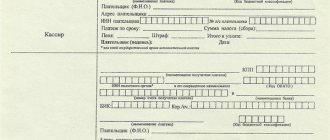Refusal of inheritance
Refusal of inheritance after six months
One of the constantly relevant topics is inheritance law.
Today we want to talk about the need to renounce inheritance after six months from the date of entry into law. Let's look at the following example: the applicant entered into inheritance rights by filling out a notarized application. Subsequently, he did not re-register the property as his own, did not use anything, and did not withdraw money from deposits. After two and a half years from the date of inheritance, a court notice came with the bank’s claim. As it turned out, the testator had an unclosed loan, and the bank is demanding payment. The heir wants to obtain a court decision to renounce the inheritance. What opportunities does the applicant have to do this within the framework of the law, and how can the refusal be motivated?
How long does it take to refuse an inheritance?
The legal heir may be released from the inheritance within 6 months from the date of opening of the inheritance, in accordance with the provisions of the Civil Code of Russia. The opening of an inheritance occurs on the day of a person’s death.
At what point in time does the inheritance take place?
All property included in the inheritance is considered the property of the legal heir from the moment the inheritance is opened, regardless of the date of actual entry into the inheritance and state registration of inheritance rights to property transferred from the deceased, if such is subject to registration with state bodies.
To enter into inheritance rights, it must be accepted by the heir. A common method of acceptance is to submit a corresponding application to a notary, which in the example under consideration was done by the applicant.
The documents of title for the inheritance are received by the heirs after filing an application six months after the opening of the inheritance. Accordingly, receiving documents on rights to inherited property is considered a right, not an obligation. The fact that the applicant did not receive title documents and did not use the property and funds on deposits that he inherited at his own discretion is not taken into account in this situation and cannot be recognized as legal.
Heirs who have entered into rights legally cannot be released from the obligations arising in connection with this if they have not received title documents for the inheritance, which is approved by the resolution of the Plenum of the Armed Forces of Russia in the provisions relating to judicial practice in inheritance cases.
Is the heir liable for the debts of the testator?
In addition to property, the inheritance also includes debts. The heirs who have entered into rights are liable for the debts of the testator to the extent of the value of the property they received. If the heir of the debtor has entered into inheritance rights, he will develop a debt to the creditor of the deceased, but only within the value of the property he received.
The estimated value of the property is determined by its total market price on the day the inheritance is opened. The testator's creditors have the right to present claims against the heirs who have entered into rights before the expiration of the limitation period, which are established for such claims by the provisions of the Civil Code of Russia. This is what the creditor bank did, sending a demand for repayment of the loan to the applicant who inherited the inheritance. If the applicant, upon entering into the inheritance, was not informed about the presence of unclosed loans with the deceased, the obligation to repay them arises on the day the claim is delivered from the creditor.
If there is no inherited property or it is insufficient to cover the claims of creditors, repayment of the debt cannot be made at the expense of the personal property of the applicant who entered into the inheritance. Accordingly, obligations for the debts of the testator are considered terminated due to the impossibility of their full or partial fulfillment.
Is it possible to refuse inheritance after 6 months?
The opportunity to refuse inheritance remains after the expiration of six months from the date of entry, but only by court decision. To do this, it is necessary to provide compelling evidence that the heir did not refuse the inheritance within the period established by law for a good reason, without being able to properly formalize his refusal. In this case, a court decision may be made recognizing the heir as having renounced the inheritance.
Therefore, the deadline for renunciation of inheritance missed by the applicant is not always subject to restoration. Often this is practically impossible.
The applicant must provide compelling arguments why the filing of the application for refusal of inheritance occurred much later than the deadline established by law. It is necessary to apply to the judicial authorities with a request to restore the period during which you can refuse to enter into an inheritance.
Of great importance is the fact that it is actually impossible to submit an application to a notary for refusal of inheritance within the period allotted by law in order to explain to the judicial authorities the reason for the omission. This could be a long-term illness, being on a long-distance expedition or a business trip. Lack of proper knowledge of inheritance laws, as well as short-term illnesses, are not compelling arguments for the court.
In addition to the above, it is necessary to provide the court with significant reasons for refusing the inheritance. Trivial explanations about an unexpected debt or unwillingness to maintain the received property cannot be recognized by the court as sufficiently weighty. all articles
There are more privileged heirs
The “Achilles heel” of the will continues to be the compulsory heirs. The law gives them a serious privilege:
they are guaranteed to receive a part of the inheritance, even if the will is drawn up in favor of a completely different person or the testator has completely deprived them of the inheritance.
The obligatory share is at least half of the share that would be due to a “special” heir in inheritance by law (without taking into account the will).
For example, a daughter wrote a will in favor of her “common-law spouse” (more precisely, her cohabitant). An accident occurred and my daughter died. And the testator’s mother claimed her rights to the inheritance.
Being disabled (of retirement age), she proved in court her right to an obligatory share, restored the deadline for accepting the inheritance and received her legal 1/2 of the inheritance.
Without taking into account the will, she would have become the only heir (the daughter had no children, and the cohabitant is not recognized as the official spouse). But taking into account the will, she only got half.
The common-law spouse clearly did not expect this (decision of the Minusinsk Court of the Krasnoyarsk Territory, case 2-3198/2017).
And starting this year, in connection with the well-known pension reform, the list of obligatory heirs has been supplemented by relatives of pre-retirement age (who have 5 years or less left before retirement).
Therefore, old-age pensioners, pre-retirees and disabled people from among:
- parents, children or spouse of the testator,
- or his other relatives - provided that he supported them,
- or not relatives at all - if they lived with the testator and received maintenance from him.
Restore deadline
It is allowed to be restored if the potential heir is unaware of the opening of the inheritance, for good reasons, for example, serious illness. And also when proving these circumstances in court within six months from the date of their termination. Pre-trial resolution of the issue is allowed if all other participants in the inheritance are not against the new applicant.
Upon successful resolution, the right is restored and the property is distributed to include an additional successor.
What are the general terms of inheritance?
The law specifies a single period for acquiring rights to an inheritance share, which is equal to six months . Its observance is mandatory for each of the called heirs.
Dear readers! The article talks about typical ways to resolve legal issues, but each case is individual. If you want to find out how to solve your particular problem , contact a consultant:
+7 (499) 938-81-90 (Moscow)
+7 (812) 467-32-77 (Saint Petersburg)
8 (800) 301-79-36 (Regions)
APPLICATIONS AND CALLS ARE ACCEPTED 24/7 and 7 days a week.
It's fast and FREE !
Peculiarities:
- the expiration of the period occurs on the next day after the death of the testator is declared;
- if the moment of death of the owner of the property is unknown (missing), the period begins to expire from the date of entry into force of the court decision declaring him dead ( clause 1 of Article 1114 of the Civil Code of the Russian Federation );
- the day of death of the will-maker is the day of opening the inheritance case ( Article 1113 of the Civil Code of the Russian Federation );
- Before the expiration of the six-month period, the heirs cannot be considered the new owners of the property.
The period for entering into inheritance may exceed 6 months if we are talking about hereditary transmission. The law indicates the possibility of extending the general inheritance period if, after the death of the main candidate, his successor (descendant in the descending line of kinship) has less than 3 months . The specified entity is additionally given 3 months to sell the transmission ( paragraph 2, paragraph 2, article 1156 of the Civil Code of the Russian Federation ).
Law enforcement practice knows cases when the period for entering into inheritance is suspended.
This is due to:
- adoption of an appropriate court decision;
- identification of the fact of conception of the testator’s child (the period will be suspended until the birth of the candidate).
Failure to comply with the requirements regarding the timing of entry into inheritance rights entails their cancellation and loss of the right itself.
However, the legal regulations allow cases of restoration of the missed period if it is proven (Article 1153 of the Civil Code of the Russian Federation):
- grounds allowing to judge the acceptance of the inheritance share by performing actual actions;
- valid reasons for absence.
Causes
Not all reasons are considered by the court as worthy of restoring the time limit for entering into inheritance.
Respectful
Valid reasons are circumstances that deserve attention due to the fact that the subject on whom they influence cannot overcome them or stop their action at their own request and at once.
The law equates the following as valid reasons:
- illiteracy of the heir;
- stay in places of detention;
- stay on a long business trip or expedition;
- long-term illness or hospital treatment;
- physical helplessness;
- restriction of legal capacity or deprivation thereof (mental disorder, failure to reach the age limit);
- lack of awareness of the death of the testator.
It is important to understand that the above circumstances must be confirmed by relevant documents, including:
- official order about sending on a business trip;
- certificates from a medical hospital;
- discharge summaries;
- court decision to impose a sentence of imprisonment;
- testimony collected to prove the illiteracy of the heir or his lack of contact with other relatives, the testator himself;
- audio and video recordings confirming the helpless state.
Disrespectful
The law does not contain information about what reasons can be classified as disrespectful. On this basis, the interested party should still challenge the missed deadline, since the court will assess the reasons for failure to comply with the deadline on an individual basis.
If unfounded arguments are given in favor of missing the deadline, to which the court does not attach importance, the heir will no longer be able to become the legal holder of the share due to him.
Can't refuse
- If there is a will and designation of the procedure for dividing property in the event of the refusal of the main heir and if there is a sub-heir. For example, when the testator determines a “spare” person in the event of the death of the main applicant;
- In case of refusal in favor of an unworthy heir (officially recognized as such);
- Without the consent of the guardianship authorities by persons who require it when renouncing the obligatory share;
- With conditions or reservations;
- After the expiration of the six-month period without judicial permission;
- From a mandatory share “by law” with the transfer of rights to a specific person, property not included in the will;
- The only one indicated in the “last will” in favor of a certain person;
- Partially.
What happens if you don't join?
The answer to this seemingly straightforward question, however, requires some clarification.
It is connected both with the inheritance itself and with the form of “non-entry”. As already noted, the period allotted for making a decision on the inheritance is established from the date of opening the case and lasts 6 months. In six months, a citizen can:
- become a de jure heir, that is, submit documents confirming such a right, for example, through kinship, and write a statement from a notary confirming acceptance of the due inheritance share;
- enter into de facto rights - for example, if you inherit a car or an apartment/house, you begin to pay for its maintenance, taxes, care, etc. This, however, does not make his rights “privileged”, and if there are other heirs, the actual reception of the property will not be enough. A court decision may challenge this;
- write and certify with a notary agent his renunciation of the share of the inherited property recognized for him and completely relieve himself of responsibility for it, or transfer the right of inheritance to another person who can accept this inheritance;
- not to participate in the inheritance procedure and in fact “keep silent”.
And in the latter case, this “decision” of the citizen will be interpreted by the notary’s office as a refusal after the 6-month period of the case on inherited property ends.
The further situation will develop in two possible ways.
If the “silence” was motivated, that is, the citizen knew about the opening of the inheritance and did not intend to receive it, then he is deprived of his share/shares in favor of other heirs of a different order. This ends his participation in the fate of the property.
The matter may turn out differently if the citizen did not have time to make a decision within the deadline due to prevailing circumstances or without being notified of the fact of the death of the testator.
Challenge the refusal
Rarely, but there are situations when it is necessary to challenge the refusal of an inheritance. This could be misleading a person, exerting psychological pressure, or deception. In this case, it is impossible to restore the rights to inheritance from a notary. You need to go to court.
The following nuances are often highlighted as the basis:
- non-compliance with the form of the document (technical errors were made, there is no notarization, personal data is incorrectly indicated);
- violation of deadlines for filing an application, for example, prepared before the date of opening of the inheritance;
- drawing up a document by an unauthorized person (incompetent);
- permission from the representative or guardianship was not observed;
- deception of the applicant when submitting documentation;
- refusal was made under threats or blackmail.
The restoration of rights is carried out by the courts at the place where the inheritance was opened. The initiator of the claim has the right to be any person and the person who refused. The statute of limitations is one year after refusal, and three years to recognize a transaction as void. Upon receiving a positive decision, the heir again goes to court to restore his rights.
Restoring a missed deadline
Sometimes it is possible to restore the term without going to court.
At the notary
The restoration of the term by the notary is conciliatory in nature, that is, the procedure is carried out upon receipt of permission from the remaining called heirs ( Clause 2 of Article 1155 of the Civil Code of the Russian Federation ).
Peculiarities:
- consent must be obtained from each of the heirs (the procedure is not feasible if at least one of the successors does not give consent);
A sample is presented here.
- The document must be prepared in writing;
- the consent must be drawn up in an individual document for each heir and contain a direct indication of the voluntariness of the decision, its signature and the date of preparation;
- the consent of other heirs must be carried out in the presence of a notary, in whose jurisdiction the inheritance case is located, or in the presence of other witnesses (not limited by law to perform such events).
A conciliatory procedure for restoring the term is unacceptable (only judicial procedure is used) if:
- only one heir is called to inherit;
- the deadline was missed by each of the heirs.
Step-by-step algorithm for the conciliation procedure:
- gathering of heirs at the notary’s office or accompanying the meeting with other witnesses;
- notarial explanation of the consequences of issuing consent (cancellation of a previously issued certificate, reduction or deprivation of a share);
- obtaining written consent from all heirs;
- filing an application for restoration of the period for the heir to assume the powers;
An example can be seen here.
- provision of necessary documents by the heir who missed the deadline;
- cancellation of previously issued certificates of inheritance;
- redistribution of shares;
- issuance of new certificates.
Do you want to understand how to assess the value of property when receiving an inheritance? See the article about this: valuation of a car for inheritance. Don’t know when you can sell an apartment you inherited? Read about it here.
Through the court
If it is impossible to resolve a dispute through a notary, or the heirs refuse to give consent to restore the term, the interested person has the right to appeal to the courts ( clause 1 of Article 1155 of the Civil Code of the Russian Federation ).
It is important to understand that the case will be considered only after filing a statement of claim. The document is presented here.
Other entities called upon to inherit may be brought in as defendants, and a notary as a third party.
One of the attachments to the claim will be a document confirming the notary’s refusal to accept the application to become an heir.
One of the following facts must be proven in court:
• the inheritance was accepted by performing actual actions ( clause 2 of Article 1153 of the Civil Code of the Russian Federation ):
- repayment of the testator's debt arising from the inheritance share;
- the heir continued to live in the inherited apartment;
- inherited property is leased to successors;
- the subject of the inheritance was significantly improved at the expense of the heir;
- the heir makes mandatory payments in relation to the bequeathed property (utility and tax burden);
- the heir took actions to preserve the hereditary mass from the encroachments of third parties and ensured its proper condition;
• the reason for missing the deadline was due to valid life circumstances ( clause 1 of Article 1155 of the Civil Code of the Russian Federation ).









